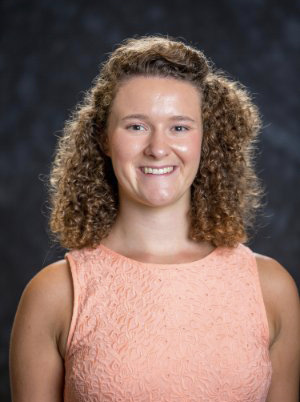The address, 3418 Osage Street South West, nestled in the hills between Johnny Meier’s ramshackle farmhouse and Old Man’s Creek, is my place. A hobby farm dedicated to sustainability amidst the industrialized conventional fields of Iowa corn. It is not my home, nor any of my relative’s, but it is the Iowa farm where I have attended summer camp—Country Camp—every year since I was seven. It is here that I learned to be enchanted by the treasure of potatoes dug from their home beneath the soil, invisible to the onlooker. It is here that I discovered the vitality of the symbiotic relationship between humans and the ecosystems of which we are a part. Time spent at Country Camp taught me to desire—no, to require—the sustainable future of our Earth.
This appreciation for Earth and my subsequent interest in sustainable agriculture persisted beyond Country Camp and into my experience in higher education at Grinnell College, where I became a part of the food justice community on campus. Throughout my involvement in the food community at Grinnell I began to wonder why women outnumbered men in the alternative agricultural movement despite the fact that agriculture on the whole is traditionally dominated by men. Furthermore, I wondered why these women remain marginalized within agricultural discussions. So began my academic inquiry into a group often forgotten: women farmers.
Bringing together women alternative farmers’ motivations, their identity as farmers, and the ways in which they conceptualize and share knowledge, I would argue that these women are actively engaged in developing an agricultural system that is unlike any that has existed before. Through their motivations to farm, these women reconfigure the link between farming and nurturing; through their identities, they claim the title of farmer and imbue it with new meaning; and, through their desire to share their local, farmer-generated, and partial knowledge, these women establish themselves as contributing consciously to a new system of agriculture. Within this system the title “farmer” has been redefined as identifying a person who is concerned with environmental—as well as economic—sustainability, and within which all genders are included.
The First, Second and Third Paradigms of Iowa Agriculture
I define a “paradigm of agriculture” as the nature of mainstream farming in a particular historical period, including certain values, knowledge, beliefs, farming methods, market priorities, technology, transportation and distribution. The First Paradigm of Agriculture began with the settlement of Iowa roughly during the 1840s and continued into the 1860s, when the railroad arrived (Bogue 1994). It is defined as the time when Iowa farmers engaged almost entirely in subsistence farming. This is to say that most agricultural products were produced by the family and for the family, rather than being sold to others.
Once railroads crossed Iowa, agriculture began to change, ushering in the Second Paradigm. This phase lasted from the 1860s through World War Two and is characterized by an increasing focus on the sale of agricultural products to local, regional, and even national markets (Nordin and Scott, 2005; Bogue 1994). On a traditional farm during either the First or Second Paradigm, a heterosexual married couple farmed together and both the man and the woman would have been responsible for equal amounts of labor. However, despite this apparent equality, a patriarchal power hierarchy prevailed and work was divided by gender. Men were likely engaged in more fieldwork and women likely maintained a garden, kept house, and prepared and preserved food.
Following the Second Paradigm, the Third Paradigm, under which we mostly live today, began roughly at the end of World War Two, and it continued gendered divisions of farm labor. What mainly set this period apart was the introduction of synthetic chemicals—specifically pesticides and synthetic fertilizers. Many of these were developed for the war effort, but were now modified and repurposed for agricultural use (Nordin and Scott 2005; Anderson 2009). During this period, farming also became more mechanized, and gasoline and electricity were increasingly used as energy sources on farms. In addition to the sharp turn into use of synthetic chemicals and machinery, the Third Paradigm is characterized by its prioritization of production and its emphasis on maximizing profit. It is large scale, chemical intensive, and male-dominated. It produces commodity crops and sells them through middlemen as opposed to bringing them to markets where consumers purchase them directly. Today, the Third Paradigm is also called conventional agriculture.
Although Third Paradigm farmers produce the majority of crops and livestock in Iowa, the story of modern agriculture does not end with them. Alternative farmers also comprise an important, albeit small, section of the Iowa agricultural system. The women whom I interviewed for this study are hopeful that their distinctive approach to agriculture will soon, either by choice or necessity, become mainstream, at which point it would become its own paradigm.
It is this developing system that I have termed the Fourth Paradigm of agriculture. According to Curtis E. Beus and Riley E. Dunlap (1990), alternative agriculture, when defined in opposition to mainstream conventional agriculture, is characterized by small-scale farms, organic-type practices, the direct marketing of products, and the inclusivity of all genders (601-608). However, beyond these methodological, I define the Fourth Paradigm in terms of motivation, identity, and knowledge sharing. Thus, the Fourth Paradigm is a system in which all farmers, regardless of gender, are motivated to farm as a way in which to nurture others, nurture the self, and nurture a sustainable agricultural system. The farmer’s identity within the Fourth Paradigm necessitates being both a community builder and a businessperson. Finally, Fourth Paradigm farmers share knowledge with the intention of improving not only the lives of individuals and communities, but also the system of food production itself. Based upon this definition, the women whom I interviewed would likely feel as if they are already a part of a new paradigm. However, as long as the new paradigm is simply an “alternative” to the mainstream, conventional agriculture system, it has not yet realized its full potential.
Motivation: nourishing versus nurturing
In all systems of agriculture, farmers—Fourth Paradigm farmers included—want to nourish the world by feeding people. For example, Shannon* said, “Good clean healthy food is an inherent right that all people have and many people don’t have access to…the most basic service I can provide to people and the community I care about is to grow good food.” Alice went so far as to say, “In my mind, farming is the most noble thing that a person could possibly do. What’s more important than raising the food for people to eat?” However, alternative farmers are motivated to do more; they also wish to nurture others and themselves, as well as to promote the ideals of the alternative agricultural community.
In light of these ideals, Fourth Paradigm farmers nurture individuals and communities by fostering both reciprocal and educational relationships. The women whom I interviewed feel compelled to act as role models and teachers for customers, employees, and other farmers. Lena said, “My CSA customers need to learn a lot of stuff about food and the environment, and so I take my job of teaching them very seriously. And I also think it’s my job to teach young farmers because I am one of the old timers and I lived to tell about it.” Lena demonstrates the alternative farmers’ impulse to nurture the minds of individuals by sharing knowledge and experiences about food production. Additionally, the Fourth Paradigm is inspired by personal relationships built with others. This paradigm is more conducive to these types of relationships because Fourth Paradigm farmers market their goods directly to customers, thus creating more opportunities for contact between famer and consumer. This is exemplified by Shannon’s love for the stories her customers regularly share with her at the Farmers Market regarding recipes and preparation of the foods she grows. She said that she is motivated to farm because of “the stories and relationships that define us and our relationship to food.”
Finally, these women demonstrated that a need for independence motivated their decision to become farmers. They talked about a deep appreciation for being in control of their own day to day activities. Alice said, “My favorite part about farming is when I have plenty of time and I can be outdoors directing myself in whatever I want to do, and I can completely lose myself in my work.” These women also discussed their love for working outside on the farm, as opposed to being in an office. Jane said, “The best part [of farming] is being outside almost all the time for so much of the year and just feeling really in the world. Not having to look through a window.” These women reject the bureaucratic constraints of the corporate world through their decision to farm and instead find a sense of freedom in their self-determined daily schedules. A cross-cultural study by Carolyn Sachs (1983) supports this idea: “it is clear that the women who are independent producers have more control over their labor and the farm operation” (108). By choosing to farm alternatively on their own operations, as opposed to working within bureaucratic, and often patriarchal, office cultures or even on farms run by men, these women reclaim control over their own labor.
At first glance, these women’s motivations appear ironic. They seek independence from the patriarchy, yet choose to join the traditionally male-dominated domain of agriculture. They are driven by an intention to nurture others, a concept gendered as feminine in this society. However, closer examination reveals that this paradox exemplifies these women’s innovative brilliance. By choosing to enter farming, these individuals reconstruct the meaning of “farmer.” They are self-reliant women who also maintain the motivation to nurture.
Identity: money, community and gender inclusivity
The identity of women farmers in the United States is not static or uniform. Disparity exists between women’s historical identification as “farm helpers” (Sachs 1983: 108) and the identification of the farmers whom I interviewed for this project as “primary farmers.” Golubovic (2011) says, “The basic meaning of identity refers to where one (a person or a group) belongs.” Further, individuals claim multiple identities based upon the different social contexts in which they exist (Stryker 1986 cited in Brasier et al. 2014: 287). An exploration of identity within the current agricultural context reveals that Fourth Paradigm farmers do more than grow food for others. Instead, their “farmer” identity encompasses concepts of community builder and businessperson, and is also inclusive of women in a way that previous paradigms have not been.
Fourth Paradigm farmers claim characteristics of caretakers and activists, demonstrating that building communities of healthy and happy people is a large part of their identities. For example, Alice sees herself as a caretaker of her land: “I think of myself as a steward of the farm. I think that the farm is my legacy, at least I intend for it to be.” Lisa sees herself as a caretaker of her livestock: “I really like to be a caretaker when livestock are birthing. Especially sheep. Lambs. They’re unique… sheep are almost like human beings.” Sandra identifies as a caretaker of many living things, both human and non-human: “…of animals, of children, of grandchildren. Sometimes of volunteers, employees. Yes. All of the above. And plants.” In addition to being caretakers, these women identify as activists, though they could also mean educators. Alice declared that she is an activist because she has a “strong opinion against industrial agriculture. I support local food, local farmers. I support family farms and am against CAFOs and integrators.” Lisa identifies as an activist through her efforts to educate people about her work: “If people are curious about how we are doing things, we invite them to the farm…”
*All names have been replaced with pseudonyms.
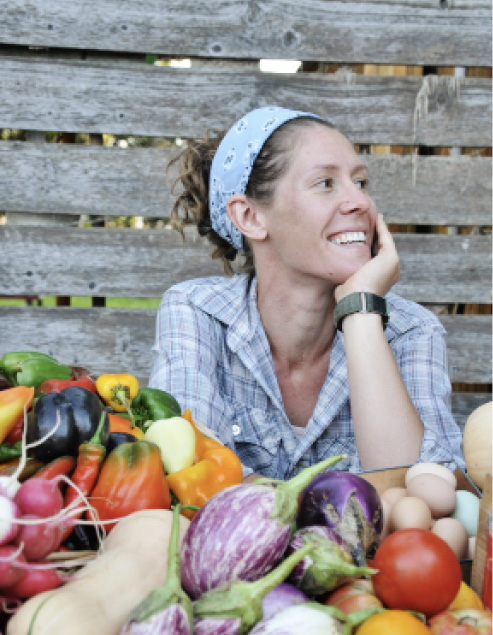
Shanti Sellz, of Muddy Miss Farms, at harvest-time. Photo by Jessica Rilling.
These women reject the bureaucratic constraints of the corporate world through their decision to farm, and instead find a sense of freedom in their self-determined daily schedules.
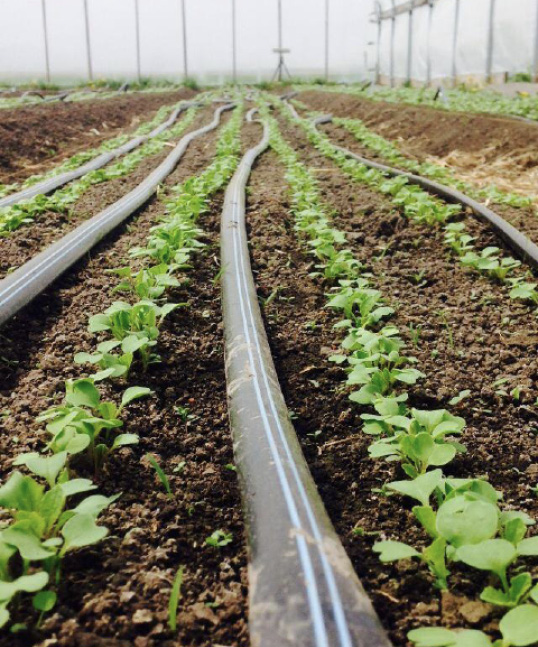
Greenhouse sprouts at Muddy Miss Farms. Photo courtesy of Shanti Sellz
Through their self-identification as activist educators and caregivers these Fourth Paradigm farmers partially fulfill societal stereotypes of women farmers. However, because they also identify as businesspeople, they push back against stereotypes. Eight of the ten women responded that they identify as businesspeople, and one is working towards identifying in this way. For example, Lena says, “You gotta make money. More is better…Every time I plant something, I say, ‘ok, we’re gonna make a lot of money on this crop.’ We usually don’t. But we make enough.” Here Lena demonstrates how a Fourth Paradigm farmer, no matter their gender, must consider financial gains and losses to maintain viability. She also exemplifies the way in which the Fourth Paradigm accepts that agriculture must function within the existing capitalist system and be able to generate profit, but that it also differentiates itself from the Third Paradigm by understanding profit to be but one criterion of a farm’s success.
Finally, the Fourth Paradigm differentiates itself on the topic of identity through its acceptance of women as farmers and its inclusivity of individuals who identify with the LGBTQ community. This is made evident primarily due to the simple fact that the women whom I interviewed identify as primary farmers and as women. Take Sandra, for example, who said that her identity as a farmer grew out of the sexism she faced as a woman in agriculture: “I was the fulltime farmer, and I think I started [identifying as a farmer] just out of annoyance, frustration and anger…I took on that identity as a way to fight back and say ‘Ok, you can’t ignore me any longer.’” This impatience was also made evident when the women said they do not wish to farm with a male counterpart because they feel this would inhibit their ability to learn the skills necessary to be farmers in their own right. Charlotte said, “I’m really glad that I’m doing this on my own actually…I also think that there are so many ways in which it would be easy to accidently defer and not learn how to do things and not ask the questions.” Further, the only instance in which a woman whom I interviewed identified as a “farmer’s wife” was in the context of Tanya’s female-female relationship in which she felt part of an equal team of farm contributors. In sum, these women balance the economic aspects of their farms alongside the agrarian ideals of community building, while also rejecting the gendered hierarchy that has characterized all types of farming up until now.
Knowledge and knowledge-sharing
These women farmers conceptualize knowledge as partial and believe it is necessary to participate in knowledge sharing communities in order to enrich themselves, their communities, and the alternative agricultural system. This understanding of knowledge coincides with that of postmodern theory. Sachs (1996) shares that within postmodern theory there is no one single “Truth,” but instead a multiplicity of truths. No one person or institution is capable of possessing all knowledge and thus a knowledge community is necessary through which to share information (19). In the Fourth Paradigm of agriculture, this means that knowledge produced by individual farmers is valued in addition to that produced institutionally. Further, knowledge is not considered to be universally applicable, but instead exists only within the context of a specific place and time. In the words of Donna Haraway (1988), knowledge is understood to be “situated…which is to say that knowledge is generated within, and applicable to, particular circumstances” (590). Put into an agricultural context this means that although a farming method may work for one particular farmer it will not necessarily work for all farmers on all farms.
Looking to the farmers themselves, Shannon explained that she gains insight on how to improve her own agricultural methods from visiting others’ operations and learning from fellow alternative farmers. She said, “any time I visit someone else’s farm, I’m always picking up little hints of how they do things, and just conversations, sitting with someone else and just talking about all the things.” Shannon seeks to gain knowledge from her peers in order to enrich her capabilities as a farmer. Charlotte described the value of alternative agriculture conferences as space in which farmers share knowledge with each other with hopes of benefiting all members of the farming community. She discussed Practical Farmers of Iowa (PFI) in particular, saying: “…there are just some really incredible networks for knowledge sharing. PFI is one of them, and I’ve really appreciated the welcome of a lot of PFI farmers to ask questions…” Finally, Kari said that she shares knowledge with some farmers who would be considered her biggest competitors because they all understand that they hold the same core values and all wish to see the system of alternative agriculture flourish. Kari justified this potentially counterintuitive decision, “We have a relationship and a trust level that we know that we’re not going to undercut each other. We know that we care about each other’s best interests. We know that we both care about the same philosophy.” This common philosophy demonstrates that these farmers share knowledge in order to support the system of alternative agriculture as a whole. In sum, these women’s conscious contribution to a new paradigm of agriculture, one that they believe to be more sustainable, by engaging in reciprocal relationships of knowledge sharing defines a fundamental characteristic of the Fourth Paradigm.
Conclusion
As members of the global community, we are faced with the challenge of an expanding population within with the challenge of an expanding population within the confines of a finite planet, a challenge to which agriculture must adapt. The question becomes: how? What will be the future of agriculture? Some people believe that agricultural adaptations should prioritize long-term sustainability of our earth, while others place the primary focus on increasing yield. However, I believe that the hope and innovation embodied by these women alternative farmers demonstrates that the Fourth Paradigm of Iowa Agriculture, a system that considers both yield and sustainability, could be, and should be, that future.
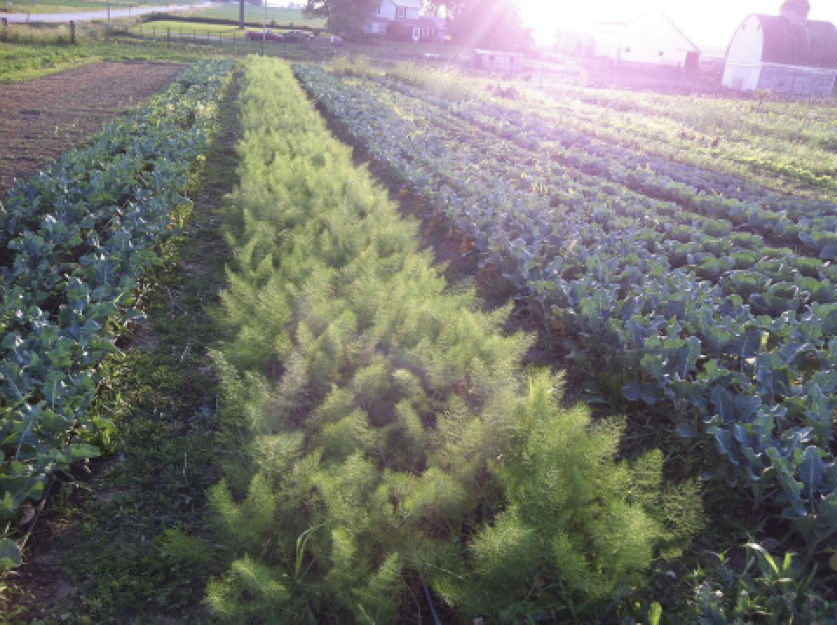
One of the fields at Muddy Miss Farms. Photo courtesy of Shanti Sellz
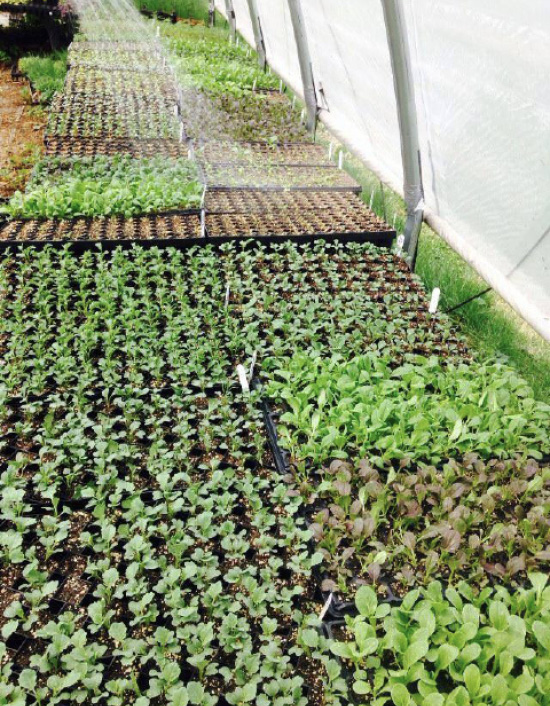
Another view of the Greenhouse at Muddy Miss Farms. Photo courtesy of Shanti Sellz
The Fourth Paradigm draws from each of the three previous paradigms in the sense that farmers wish to feed others, while also advancing its own unique characteristics. Farmers within this paradigm are motivated to farm both because of a culturally defined “feminine” drive to nurture, as well as the culturally defined “masculine” need to be independent and in control of one’s own labor. They claim multiple identities related to farming, some of which are associated with stereotypically male roles, such as farmer and businessperson, and some of which are associated with stereotypically female roles, such as teacher and caregiver. Finally, they conceptualize knowledge as a multiplicity of truths, and they wish to engage in knowledge sharing as a way to benefit themselves, their direct community, and the alternative agriculture system as a whole. Thus, they express their desire to transform Iowa agriculture and feel as if they are an important part of this change. In the words of Tanya: “If you’re gonna complain about something, then you need to see what you can do to change it. And I feel like even on just our acre and a half, I have an opportunity to be an example.”


